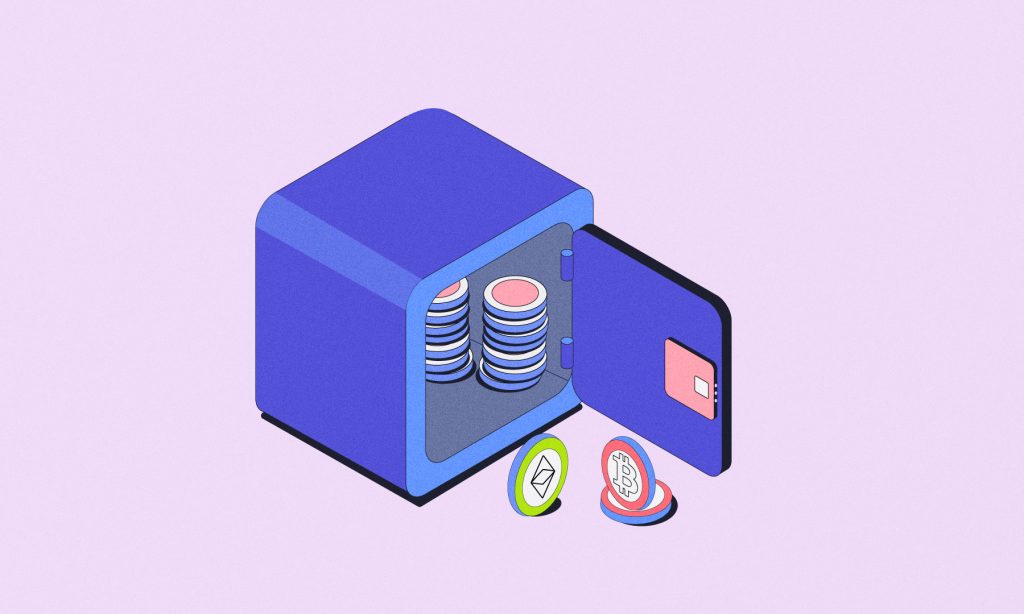Vaults are generally used to store stuff, right? So you have the right idea of what a crypto vault might be. But how do they work? Stick around to find out.
What are crypto vaults?
Since we’ve already asked, “what is a vault?” this shouldn’t take time. Vaults are enclosed, secure places where you store things. So crypto vaults are where you put away crypto, just like crypto wallets.
Crypto vaults, however, come with an added layer of security. They may have a transaction approval procedure that prevents instant withdrawals. Or they could ask for multiple co-signers. When compared to standard crypto wallets, vaults are far more secure.
How to use a crypto vault
You may either give the sender the one-of-a-kind address associated with your vault. Alternatively, you could move the crypto straight into the vault from your wallet.
However, retrieving assets from a vault is more complicated. It is, in fact, deliberately designed to be that way. First, you will have to submit a withdrawal request. Then, your primary and secondary email addresses will each receive a confirmation email. Only after the authorization is complete will the transaction go through.
Withdrawals are usually put off for a period of 48 hours after the vault receives permission. As a vault owner, this gives you an extra security “firebreak.” During this time, you may reject the request if you wish to.
Pros and cons of crypto vaults
As with all good things, crypto vaults also have a few cons. Here’s where we list out all the pros and cons.
Pros
Cryptocurrency vaults provide more security than wallets by requiring authorization and allowing for the cancellation of transactions.
Those who want to hold Bitcoin and other cryptos for an extended time will appreciate the security offered by a cryptocurrency vault, as the withdrawal delay helps prevent them from making hasty trading choices.
Vault owners have the opportunity to reverse their transactions for a limited time.
When several authentication steps are involved, it becomes considerably more difficult for hackers to steal money.
Cons
Vaults make crypto inaccessible, so owners cannot spend or sell their holdings so swiftly. This can be particularly bothersome during periods of extreme market volatility.
What makes crypto vaults different?
Vaults are different from all the other options out there. Let’s take a minute to reflect on how and spell it out.
Vault vs. Cold wallet
Much like cold wallets, vaults are not linked to any network. Therefore, they provide the same level of protection from cybercriminals—meaning a higher degree.
However, vault users, unlike users of physical wallets, do not need a private key for access. Therefore, you are less likely to lose access due to small mistakes like misplacing your private key.
Vault vs. Hot wallet
A vault is much safer than a hot wallet, which might be stolen if the owner loses the private key or a hacker accesses it via the internet. That is why the standard practice among investors is to hold a small amount of capital in a hot wallet or exchange. They usually move the remainder to a cold wallet or vault.
Vault vs. Bitcoin vault
A crypto vault need not be limited to a single crypto. A Bitcoin Vault, on the other hand, is. The Bitcoin Vault is an enhanced token-specific storage option that uses a 3-key security solution. It allows the reversal of withdrawals within 24 hours.
How to choose a crypto vault
While the basic concept of each crypto vault that various exchanges offer is identical, there are important distinctions between them. They vary according to the number of approval layers, security level, fees, and registration.
Approval layers
You can use either an individual or a group vault. The number of signatories required to withdraw will depend on your selection.
Security level
Various delay lengths and approval levels are available among vaults. Several providers will even give you the option of personalizing the settings of your vault.
Fees
Some service providers offer a safe deposit box at no additional charge (even though there might be costs associated with withdrawals and transfers). However, there might be a membership or startup cost.
Registration
Vaults may be restricted to consumers from just a few countries. As you narrow your selection of potential vaults, enquire about applicable limits.
Conclusion
A crypto vault offers a safer means of storing Bitcoin and other cryptos than standard wallets. Thanks to its additional security and verification measures.
That said, although vaults make your assets more secure, it is more difficult to access. If you want to keep some of your money easily accessible while protecting your long-term investments, you could combine crypto wallets and vaults.
FAQs
1. How do I withdraw crypto from a vault?
To get your money out of your vault, you may need to follow these steps:
- Enter your user dashboard and choose “Vault.”
- Select “Start a Withdrawal.
- To send crypto, either key in a recipient’s address or choose a wallet from the dropdown menu.
- After a detailed investigation, verify the withdrawal and execute a transaction.
2. Should I put my crypto in a vault?
Vault is a crypto storage option developed specifically for the long-term safekeeping of digital assets. It’s a convenient alternative to setting up cold storage or a paper wallet.
3. What is the difference between a crypto wallet and a vault?
To access your digital wallet, you will need a private key. A hacker can gain access to this. However, without authorization, they cannot retrieve assets stored in a cryptocurrency vault.
4. What is the best crypto vault?
Coinbase Vault is one of the better options for long-term storage, but it ultimately depends on your requirements. Keeping smaller quantities on an exchange or hot wallet is good as they provide quick access.
5. How do I deposit money into vault crypto?
Create an account on a crypto platform, generate a deposit address, transfer funds from your bank account to the address provided.








